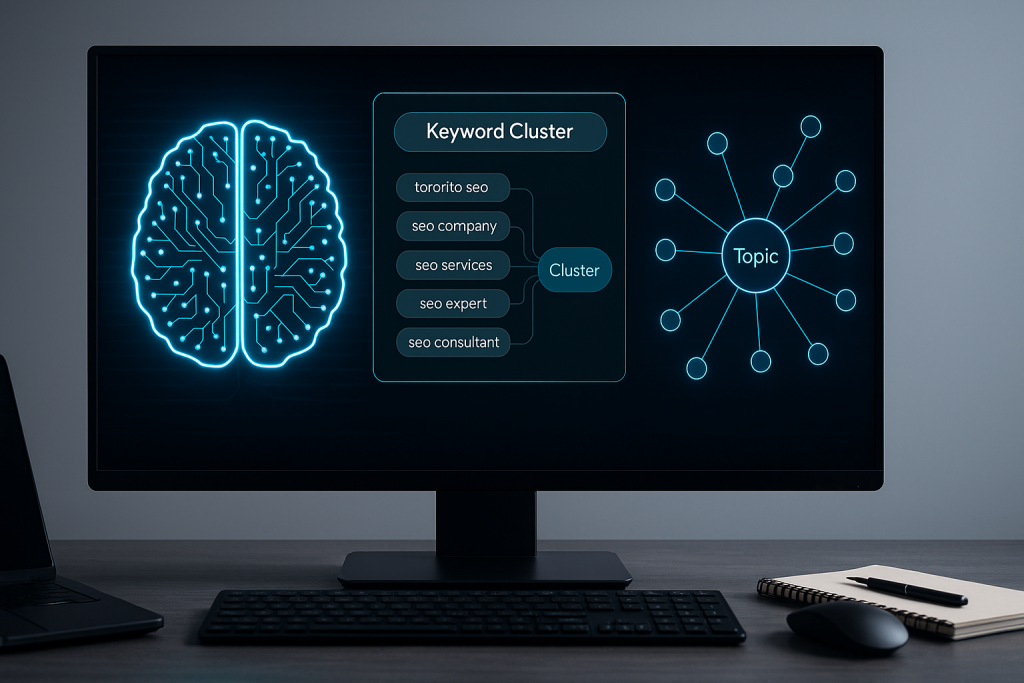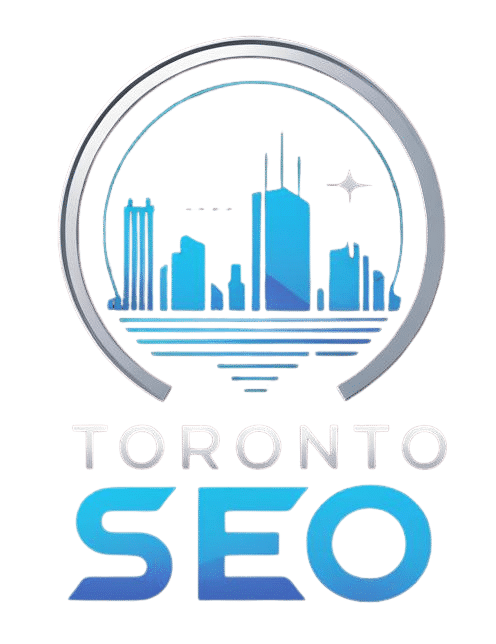The End of Guesswork in SEO
The way Toronto businesses approach keyword research and topic clustering is undergoing a radical transformation. Artificial intelligence (AI) is changing how SEO experts map intent, cluster content, and build topical authority across pages. Traditional keyword spreadsheets are being replaced by AI-powered topic mapping systems that predict how search engines understand relationships between terms, pages, and entities.
In Toronto’s highly competitive SEO market—where agencies battle for dominance in industries like law, real estate, and eCommerce—AI-driven keyword clustering has become more than a competitive edge; it’s a necessity. By using advanced machine learning and natural language processing (NLP), businesses can now build content ecosystems that align perfectly with Google’s entity-based ranking model.
Understanding Keyword Clustering in 2025
From Keywords to Topics: The SEO Paradigm Shift
Keyword clustering used to mean grouping similar keywords manually in spreadsheets—an approach that quickly became outdated as Google’s algorithms evolved. With the rise of semantic search and AI overviews, Toronto SEO professionals now focus on building topic maps—comprehensive networks of semantically related content designed to signal authority and intent.
Rather than optimizing a single page for a single keyword, AI-based clustering tools analyze thousands of search queries and contextual relationships between them. This results in smarter content silos that support a brand’s expertise across multiple layers of search intent.
Example: Instead of writing five separate blogs about “Toronto real estate SEO,” “SEO for real estate agents,” and “Google My Business for realtors,” AI clusters these under a single content hub on “Real Estate SEO in Toronto,” interlinking all relevant subtopics for maximum topical authority.
How AI-Powered Topic Mapping Works
1. Machine Learning for Search Intent Recognition
AI models process search data using transformers—the same type of model behind Google’s RankBrain and BERT. They categorize intent (informational, navigational, transactional) and group keywords that share searcher goals. This allows SEO strategists to plan content with precision, matching each page to a distinct user journey phase.
2. NLP for Semantic Relationship Discovery
AI uses Natural Language Processing (NLP) to identify synonyms, related entities, and co-occurrence patterns in Google’s top-ranking pages. Tools like ChatGPT and Surfer SEO now simulate how Google understands topic clusters, helping Toronto SEO agencies build content silos that Google trusts.
3. Predictive Modelling for Topic Expansion
Machine learning models can predict future keyword trends, giving local businesses the opportunity to create content before competitors do. For instance, predicting rising searches around “AI SEO tools Toronto” or “local SEO automation” allows early positioning.
To dive deeper into this evolving AI landscape, explore The Future of SEO in Toronto: Where Artificial Intelligence Meets Search Strategy.
Why Toronto Businesses Need AI Keyword Clustering
Toronto is home to some of the most competitive SEO markets in North America. From law firms and dental clinics to tech startups, every niche fights for visibility. Manual keyword research can’t keep up with:
Thousands of related search variations
Dynamic SERP (Search Engine Results Page) updates
AI-generated summaries (SGE/AI Overviews)
Voice search and long-tail conversational queries
AI clustering tools automatically identify ranking opportunities and content gaps, helping businesses publish hyper-relevant pages that rank faster and stay resilient against algorithm updates. Learn more about this competitive edge in Toronto Marketing Agencies Are Winning with AI-Driven Keyword Clustering in 2025.
Building an AI-Powered Topic Cluster Strategy
1. Audit Your Existing Content
Start by mapping your current blog posts and landing pages. Identify overlapping topics, duplicate targeting, and orphan pages that don’t fit into a topical hierarchy. You can use insights from Toronto SEO Audit Checklist: Is Your Website Fully Optimized for 2025? to structure your audit.
2. Train AI Tools on Local Intent
Toronto businesses benefit from localized AI clustering that understands regional nuances—such as “near me” searches or neighborhood-level intent (“SEO agency in North York” vs. “Downtown Toronto SEO expert”). Fine-tuning models ensures hyperlocal relevance that generic keyword tools miss.
3. Create Pillar Pages and Supporting Content
Use AI to map pillar pages (broad topics) and cluster content (supporting articles). For instance:
Pillar: AI SEO in Toronto: How Machine Learning Shapes Search
Cluster: Predictive SEO in Toronto, AI Content Optimization Tools in 2025, Voice Search SEO for Local Businesses
See AI SEO Toronto: Leveraging Machine Learning for Smarter Keyword Targeting for an in-depth approach to AI-driven content structure.
Entity-Based SEO and the Power of Semantic Linking
Search engines now evaluate how well a website covers an entire topic cluster, not just individual keywords. AI keyword clustering helps create semantic relationships that Google recognizes as authoritative.
For instance:
Linking “AI SEO Toronto” with “Machine Learning Keyword Research Toronto” and “AI Content Optimization Tools Toronto” reinforces expertise in the AI SEO niche.
Adding structured data (schema) to signal topical hierarchy further enhances contextual understanding.
Toronto agencies are integrating this approach alongside E-E-A-T principles (Experience, Expertise, Authority, and Trust) to strengthen their content ecosystems.

The Role of AI in Predictive SEO and Dynamic Updates
AI doesn’t just cluster existing keywords—it forecasts new ones before they become mainstream. Through predictive SEO, Toronto brands can identify rising trends weeks or months before competitors. This future-facing approach ensures sustained organic visibility even during Google’s algorithm updates.
To stay current, explore Understanding Google’s Latest Algorithm Update, where AI’s role in ranking volatility is detailed.
Real-World Use Case: Toronto Agency Using AI Topic Clusters
A local digital marketing agency in Toronto implemented AI-driven topic mapping using OpenAI and clustering APIs. Within 90 days:
Organic traffic increased by 47%
Content overlap decreased by 60%
Keyword cannibalization dropped to nearly zero
Average keyword ranking positions improved across 18 clusters
By combining semantic AI tools and human editorial judgment, they created topic hubs around AI SEO, local optimization, and machine learning trends—dominating competitive SERPs like “AI SEO Toronto” and “SEO automation tools.”
Learn how agencies are achieving this scale in Top SEO Agencies in Toronto Are Using AI to Outrank the Competition.
External Industry Insights
The global adoption of AI for SEO is backed by major data sources:
Google AI Blog discusses how machine learning models interpret content relevance and context.
HubSpot’s State of AI in Marketing Report highlights how businesses using AI-powered SEO tools experience 2.3x faster content growth.
These insights validate what Toronto’s SEO professionals already know: AI-powered topic mapping is no longer optional—it’s the standard for scalable, future-proof optimization.
Practical Benefits for Toronto Businesses
Reduced Content Waste: Stop duplicating efforts with clear content hierarchy.
Improved Interlinking Strategy: Seamless internal linking improves crawl depth and contextual authority.
Higher Conversion Rates: Targeted intent clusters mean better-aligned landing pages.
Algorithm Resilience: Semantic topic mapping stays stable during core updates.
Local Dominance: Tailored clusters for “Toronto,” “Mississauga,” and “GTA” keywords maximize local reach.
For example, combining insights from AI SEO for Small Businesses in Toronto: Affordable Solutions That Scale can help local companies automate and scale AI-based content plans effectively.
How to Measure AI Keyword Clustering Success
Key Metrics:
Topical Authority Score – Track how Google indexes and ranks topic clusters.
Internal Link Flow – Evaluate how well authority passes between pillar and cluster pages.
Organic Growth Velocity – Measure ranking acceleration using AI-driven analytics.
Content Gap Fill Rate – Monitor completion of entity-based coverage.
For ongoing performance evaluation, read How to Track SEO Performance with Analytics.
Conclusion: Toronto’s Next SEO Frontier
The future of keyword clustering in Toronto SEO lies in AI-powered topic mapping—an approach that merges data science, NLP, and strategic content planning. As Google’s algorithms evolve to prioritize topical depth and semantic context, agencies and brands that invest in AI-driven clustering today will dominate organic rankings tomorrow.
If your business is ready to adopt an AI-based content strategy that outperforms competitors, connect with the experts at TorontoSEO.com Contact Page to start mapping your path to top rankings.
Frequently Asked Questions (FAQs)
1. What is AI keyword clustering?
AI keyword clustering uses machine learning to group keywords based on intent, semantics, and search behavior—automatically generating topic clusters for more effective SEO.
2. How does topic mapping improve SEO rankings?
It builds interconnected content silos that signal expertise to search engines, improving topical authority and rankings across entire keyword families.
3. Why is AI keyword clustering crucial for Toronto businesses?
Toronto’s market is competitive; AI clustering allows faster insights, reduced manual labor, and a scalable way to dominate high-value niches.
4. Can AI replace human SEO strategy?
No. AI enhances SEO by providing data-driven insights, but human expertise is vital for contextual understanding, creativity, and brand alignment.
5. How can I start AI-powered topic mapping for my business?
Begin with a content audit, integrate AI clustering tools, and build a pillar-cluster architecture. Partner with an experienced Toronto SEO agency for long-term success.


